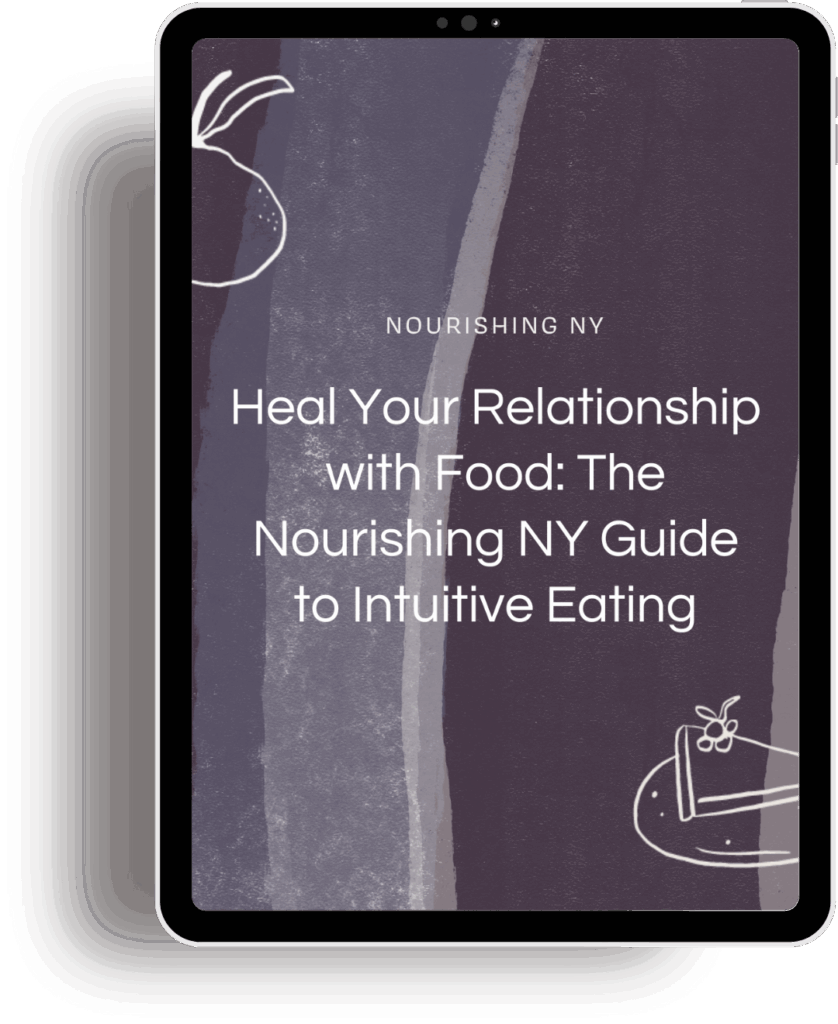Why the Right Fit Matters
Finding a dietitian can feel overwhelming, especially when you’re seeking support for something as personal as your relationship with food. It’s important to find someone you can truly trust – someone who listens, understands your unique experiences, and creates a space where you feel safe. Choosing a dietitian in NYC with specialized training and experience in eating disorders is also essential, as they’ll have the knowledge and expertise to guide you through recovery with compassion. Here are some steps to take to choose wisely and find the right fit for your recovery journey.
Step 1: Verify Credentials
First, it’s important to make sure you are receiving care from a Registered Dietitian Nutritionist (RDN) or Registered Dietitian (RD). If someone advertises themselves as a nutritionist or health coach, they may not be credentialed as a RD/RDN.
If someone is credentialed as an RD/RDN, they have completed the following:
- A bachelor’s degree in nutrition/dietetics
- A master’s degree
- A 1,200 hour dietetic internship
- A passing score on the national registration exam
For registered dietitians in NYC, a certification is required to provide medical nutrition therapy and accept insurance. This credential is called Certified Dietitian Nutritionist (CDN). At Nourishing NY, all our eating disorder dietitians hold the RD/RDN and CDN credential. Click here to see what insurance companies we are in network with.
Anyone can call themselves a nutritionist or health coach as there is no regulation around the title. They do not require credentialing or licensure. In other words, a registered dietitian is a nutritionist, but a nutritionist is not a dietitian. Seeking out an RD/RDN ensures you are receiving evidence-based nutrition therapy.
Step 2: Look for Eating Disorder Expertise
Once you’re found clinicians with the RD/RDN credential, it’s important to look for eating disorder expertise. Some key words to look out for on a nutrition practice website are:
Health at Every Size® (HAES®)1
This is a framework of care created by the Association for Size Diversity and Health. When a registered dietitian is aligned with HAES®, this means they provide nutrition counseling from a weight neutral lens with compassion. The 4 principles and 10 core elements are at the center of their framework. The 4 principles of HAES® are:
- Healthcare is a human right for people of all sizes, including those at the highest end of the size spectrum.
- Wellbeing, care, and healing are resources that are both collective and deeply personal.
- Care is fully provided only when free from anti-fat bias and offered with people of all sizes in mind.
- Health is a sociopolitical construct that reflects the values of society.
Certified Eating Disorders Specialist (CEDS or CEDS-C):
A credential achieved from The International Association of Eating Disorders Professionals (iaedp).
Weight neutral:
An approach to health and general wellness that focuses on improving health outcomes rather than emphasizing weight loss or body size. This is a holistic approach to improving health outcomes, including eating habits, sleep, movement, mental and emotional health, and social connections.
Intuitive eating/Certified Intuitive Eating Counselor (CIEC)2:
Intuitive eating is a self-care eating framework built on 10 principles. These principles highlight various topics, including honoring hunger and fullness, finding joyful movement, respecting one’s body, and rejecting diet mentality. A certified intuitive eating counselor has been trained in the intuitive eating framework.
Trauma-informed care:
A dietitian in NYC that provides nutrition counseling through a trauma-informed lens realizes the impact of trauma, recognizes the signs and symptoms of trauma, and seeks to actively avoid re-traumatization. 3 Eating disorder dietitians in NYC providing trauma-informed care will provide a safe, trustworthy space to empower clients in their eating disorder recovery.
Step 3: Consider Logistics
After finding a referral list of registered dietitians (RD/RDNs) that specialize in eating disorders, the next step is figuring out the logistics.
- Location: If you prefer in-person sessions, finding a registered dietitian in NYC that has an office to offer in-person support is important. Nourishing NY offers in-person offices located in NYC and Watertown, NY. In-person and virtual both have pros and cons, so discussing with your treatment team the best approach is important. Virtual options increase the availability of RDs, as long as they are licensed in your state of residence. Our dietitians at Nourishing NY are licensed in various states and provide virtual nutrition counseling in Arizona, California, Colorado, Connecticut, Delaware, Florida, Maine, Massachusetts, Michigan, New Jersey, New York, Pennsylvania, Texas, and Virginia.
- Insurance: If you’re looking for in-network nutrition support, checking insurance coverage is important. This information can usually be found on a nutrition practice website or can be discussed during an initial phone call. Nourishing NY is in-network with Aetna, Blue Cross Blue Shield, Cigna, Healthfirst, United Healthcare, and some Medicaid plans.
- Budget: If a nutrition practice or registered dietitian is not in-network with your insurance plan, it’s important to assess your budget. Inquiring about out-of-pocket fees and potential sliding scale fees can be helpful when trying to find an eating disorder registered dietitian in NYC.
Step 4: Ensure Whole-Person Support
Working with a full treatment team is vital for eating disorder treatment and recovery4. It is important that you seek out an eating disorder registered dietitian in NYC that also communicates frequently with the rest of your team to provide you with the best support. NYC dietitians at Nourishing NY collaborate with all treatment team members, including doctors, therapists, psychiatrists, recovery coaches, and higher level of care providers. With consent, Nourishing NY will also connect with your loved ones and other supports.
An eating disorder dietitian in NYC that focuses on your long-term recovery, not short-term fixes, is not only important but a key in your recovery journey. Choosing the right NYC dietitian can make recovery sustainable and empowering.
Ready to begin your work with a dietitian in NYC through Nourishing NY? Contact Us
- Association for Size Diversity and Health. Health at Every Size® Principles. https://asdah.org/haes/
- The Original Intuitive Eating Pros. 10 Principles of Intuitive Eating. https://www.intuitiveeating.org/about-us/10-principles-of-intuitive-eating/
- Substance Abuse and Mental Health Services Administration. Trauma-Informed Approaches and Programs. https://www.samhsa.gov/mental-health/trauma-violence/trauma-informed-approaches-programs
- Bray, M., Heruc, G., Evans, L., & Wright, O. R. L. (2024). The imperative of collaboration: Lived experience perspectives on team approaches in outpatient eating disorder treatment. International Journal of Eating Disorders, 57(1), 116–123. https://doi.org/10.1002/eat.24084



